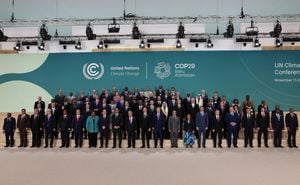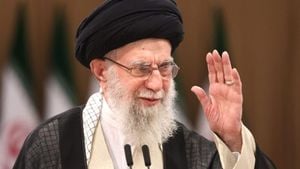Pope Francis has recently made headlines for his unprecedented call for an international investigation to examine whether Israel's military actions against Hamas in Gaza could be classified as genocide. This statement marks the first time the pontiff has publicly acknowledged the pervasive accusations surrounding the Israeli operations since the conflict reignited following Hamas's violent attack on October 7, 2023.
Francis's remarks were revealed through excerpts from his forthcoming book, titled Hope Never Disappoints: Pilgrims Towards a Better World, as published by the Italian daily La Stampa. He stated, “According to some experts, what is happening in Gaza has the characteristics of genocide,” emphasizing the need for careful examination to determine if these actions fit the technical definition established by international legal standards.
His comments come at a time when the situation in Gaza has escalated dramatically, with reports of significant civilian casualties. According to the Hamas-run health ministry, the number of fatalities exceeds 43,846, most of whom are believed to be civilians, underscoring the gravity of the humanitarian crisis. Earlier, the United Nations Special Committee had deemed Israel's military conduct as consistent with the characteristics of genocide, citing the use of starvation as a method of warfare.
The call for investigation by Pope Francis has not gone unnoticed, drawing support and condemnation from various quarters. The Council on American-Islamic Relations (CAIR) welcomed the pontiff's call, asserting the need for accountability by global leaders, including the Biden administration, to acknowledge the violence as genocide and act accordingly.
CAIR's executive director, Nihad Awad, remarked, “Religious and political leaders worldwide are calling Israel’s murderous campaign in Gaza what it is – genocide.” His statement highlights the rising global discourse around Israel's military actions and their alignment with international definitions of genocide.
The situation remains tense, with reports continuing to emerge of violence on both sides. Just recently, Israeli airstrikes resulted in the death of numerous Palestinians, including children. During this upheaval, Francis has also been vocal about the plight of hostages taken by Hamas during the initial attack, emphasizing the need for their safe return.
On the other hand, the Israeli government has indignantly rejected allegations of genocide, stating their military operations aim to dismantle the threat posed by Hamas, which they hold responsible for civilian casualties due to their use of human shields.
Combining the Pope's call and global reactions draws attention to the increasingly polarized views surrounding the Israeli-Palestinian conflict. Groups and individuals around the world are aligning themselves with different narratives, often reflecting deep historical tensions.
Israel's Foreign Ministry has been reticent to engage with the Pope's latest statements, maintaining their position against the idea of genocide. A spokesperson reiterated Israel's commitment to civilian protections, framing the military response as necessary for national security.
Further complicity is evident with international relations, particularly concerning the U.S., which has been criticized for its unwavering support of Israel. There are voices calling for the Biden administration to reflect on its stance amid mounting civilian casualties.
Meanwhile, various humanitarian organizations have been proactive, pushing for peace negotiations and ceasefires, emphasizing the dire need for humanitarian aid to enter Gaza. The religious and civil rights organizations continue to urge their representatives to confront the complex reality on the ground, advocating for accountability where needed.
Pope Francis has long been recognized for voicing compassion for all those affected by war, and his recent comments reinforce this notion. By calling for investigations, he positions the Catholic Church as not just spiritually engaged but also politically reflective during this crisis.
This moment of confrontation appears pivotal as it joins the larger narrative of accountability, human rights, and the humanitarian response within global diplomatic channels. The Pope's challenge to the world's leaders reflects not only ecclesiastical leadership but also the pressing urgency for responses to the human costs of the conflict.
With these events taking place, the call for investigations brings much-needed spotlight and scrutiny to the realities facing civilians trapped within the violence. The humanitarian imperative remains front and center, supported by advocacy and public outcry for justice amid the chaos.



